BVB Walk of Fame
The BVB Walk of Fame is a thematic walkway through the city of Dortmund .
The route was named after the Hollywood Walk of Fame . It traces the history of the Borussia Dortmund football club and leads you along originally 100 stars set into the sidewalk through the city, from the club's birthplace near Borsigplatz to the Westfalenstadion . Each star is labeled and reminds of a striking point in time or name in the club's history.
history
To mark the 60th birthday of the Ruhr Nachrichten , the Dortmunder Zeitung wanted to give the BVB, which was founded in 1909 and of which it is a media partner, 100 memorial plaques to commemorate the club's history. They should be immortalized as stars in the sidewalk , modeled on the Hollywood Walk of Fame . The idea received great support not only from the club, but also from the city administration.
Each stone is bought from a sponsor whose logo appears in the top left corner of the respective board. The Ruhr Nachrichten logo can be seen in the top right corner .
The first stone to be laid in front of the stadium on September 26, 2009 was the star no. 100 with the simple inscription "100 years BVB". Four people together laid the first stone on their behalf: Aki Schmidt as a historical BVB player figure, BVB managing director Hans-Joachim Watzke , Lutz E. Dreesbach from the main sponsor Evonik , and publisher Lambert Lensing-Wolff from the organizing media company Lensing , the publishing house of the BVB media partner , the Dortmund newspaper Ruhr Nachrichten .
The other 99 stars followed, which were often relocated with the honored people themselves and accompanied by media.
Since then, the sponsors have also used their commitment to better represent themselves.
On Monday, August 30, 2010, the number 1 in front of the Dreifaltigkeitskirche as the nucleus of the BVB was inserted, the last stone. The opening ceremony on September 1, 2010 in the church was moderated by the Dortmund cabaret artist Bruno Knust and took place in the presence of the most important club representatives and a number of former players who were honored on the stars. The BVB Walk of Fame also received church blessings.
The Walk of Fame kept causing news, for example after a stolen star in March 2010, or on the occasion of the visit of Schalke manager Rudi Assauer , who also received his own stone. The long-time manager of BVB rival Schalke 04 was a BVB player on the winning team of the 1966 European Cup , with which a German team won a European club competition for the first time. The laying of a stone for BVB team captain Sebastian Kehl after his retirement in 2015 was also reported nationwide.
After originally 100 stars were attached for the first 100 years of BVB history, the club has since been relocating additional stars for special events and merits. This is justified with the continuing history of the club, which the Walk of Fame should continue to represent.
List of stars
| image | number | position | inscription | background |
|---|---|---|---|---|

|
1/100 | Flurstr. 10 | 1901 Trinity Congregation as the nucleus of the association | The Dreifaltigkeitsgemeinde near Borsigplatz is considered to be the nucleus of BVB. A boys' group was founded here in 1901, from which the ball game club Borussia 09 eV emerged in 1909. |
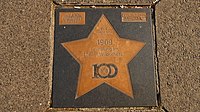
|
2/100 | Oesterholzstrasse 60 | 1909 founding in the restaurant "Wildschütz" | On December 19, 1909, BVB was founded in the “Wildschütz” bar. Today the chip shop “Pommes Rot-Weiss” is located there, but a plaque on the house reminds of the date, and there are many reminders in the chip shop. |

|
3/100 | Entrance area Hoeschpark | 1910 White Meadow Hoeschpark venue (1910–1937) | From 1910 to 1937, what is now the Hoeschpark , the " White Meadow ", was the first BVB venue, which then had to give way to the expansion of the Hoesch site. |

|
4/100 | Wambeler Strasse 14 | 1910 Admission to the West German Gaming Association | In 1910, BVB was officially accepted into the West German Gaming Association . |

|
5/100 | Wambeler Strasse 10 | 1910 Residence Franz Jacobi 1st club president (1910–1923) | Franz Jacobi , BVB co-founder and first club president from 1910 to 1923 , lived at Wambeler Straße 10, not far from Borsigplatz . |

|
6/100 | Wambeler Strasse 4 | 1911 Röhr printing works 1st sponsor | According to the BVB website, the stone is dedicated to "BVB rescuer Heinrich Schwaben, 2nd club president". Heinz Schwaben was director of the Dortmund Union Brewery , to which Jacobi handed over the chairmanship of the association so that, as a business representative, he should enable the necessary stadium expansion. However, the stone itself now bears the inscription of the Röhr printing company as the association's first sponsor, which was presumably located at 4 Wambeler Strasse. |

|
7/100 | Borsigplatz 9 | 1st official soccer match 01/15/1911 | BVB's first regular game took place on January 15, 1911 against VfB Dortmund and was won 9: 3. |

|
8/100 | Borsigplatz / corner of Oestermärsch | 1913 BVB turns black and yellow (02/14/1913) | The BVB players played in blue and white striped shirts with red sashes as a sign of solidarity with the labor movement . With the inclusion of FC Schalke 04 in the West German game association in 1913, a new color choice was made to distinguish them. Since then, BVB has played in the black and yellow colors of the city's coat of arms. |
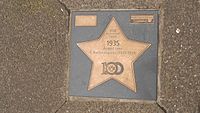
|
9/100 | Oesterholzstrasse 34 | 1935 August Lenz 1st national player (1935–1938) | August Lenz was the first BVB player to play for the German national team, for the first time in 1935, in a game against the Spanish national team . |

|
10/100 | Oesterholzstrasse at the corner of Enscheder Strasse | 1935 Fritz Thelen becomes the first trainer | Fritz Thelen became BVB's first professional trainer in 1935. |

|
11/100 | Weissenburger Strasse 71 | 1937 Relocation to the Rote Erde stadium | In 1937, BVB had to give up its Weißes Wiese stadium (see No. 3) and moved to the Rote Erde stadium . |

|
12/100 | Weißenburger Straße (at the company gate, opposite the power station wall) | 1943 1st win against Schalke 04 | For the first time, BVB won in the Gauliga season 1943/44 against the top German club at the time, rivals Schalke 04, 1-0. ( Note: the board was pasted over by Antifa activists with a sticker that they usually use to cover neo-Nazi stickers. ) |
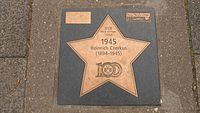
|
13/100 | Weißenburger Strasse / corner of Güntherstrasse | 1945 Heinrich Czerkus (1894–1945) | Heinrich Czerkus was BVB club manager and was executed as a communist and resistance fighter against National Socialism in the spring of 1945 during the Good Friday murders of the Nazis. |

|
14/100 | Weißenburger Strasse / crossing Geschwister-Scholl-Strasse | 1947 BVB becomes Westphalia champion after defeating Schalke | On May 18, 1947, BVB became Westphalia champions with a 3-2 win over Schalke. The victory is also seen as a turning point in the west , as it broke the supremacy of Schalke 04 in the region. |

|
15/100 | Geschwister-Scholl-Strasse 20 | 1948 BVB becomes 1st West German champion | In 1948, BVB became the first champion of the West German Football League , newly founded in 1947 , one of the five seasons of the top division in the Federal Republic of Germany. |

|
16/100 | Geschwister-Scholl-Strasse 22 | 1949 German runner-up | In the final of the German soccer championship at the Neckarstadion in Stuttgart on July 10, 1949, BVB lost to VfR Mannheim only in extra time with 2: 3. |

|
17/100 | Geschwister-Scholl-Strasse 26 | 1951 1st international game (May 9, 1951) | On May 9, 1951, BVB competed abroad for the first time. As part of the Festival of Britain national exhibition, the Dortmund team achieved a 1: 1 against the English first division club Derby County . |

|
18/100 | Geschwister-Scholl-Strasse 28 | 1954 Heinrich Kwiatkowski in the World Cup squad | The BVB goalkeeper Heinrich Kwiatkowski was appointed to the squad for the German national team for the 1954 World Cup without having ever played a game in the A-selection. |

|
19/100 | Sidewalk in front of the Fritz-Henßler-Haus | 1956 1st German championship | BVB won its first German championship with the German soccer championship in 1955/56 . |

|
20/100 | Schwanenwall / corner of Bornstrasse | 1956 Alfred "Adi" Preißler (German championship '56 + '57) | Alfred Preißler was BVB team captain at the first two German championships won in 1956 and 1957 |

|
21/100 | Burgwall 3, at the Hotel Esplanade | 1956 Alfred Kelbassa (German championship '56 and '57) | Striker Alfred Kelbassa was one of the three Alfredos in the Dortmund championships of 1956 and 1957, together with Alfred Preißler and Alfred Niepieklo. |

|
22/100 | Burgwall / corner of Johannisborn | 1956 Alfred Niepieklo (German championship '56 and '57) | Striker Alfred Niepieklo was one of the three Alfredos in the Dortmund championships of 1956 and 1957, together with Alfred Preißler and Alfred Kelbassa. |

|
23/100 | Castle wall 15 | 1956 Elwin Schlebrowski (German championship '56 and '57) | Elwin Schlebrowski was one of the pillars of the Dortmund championships in 1956 and 1957 |

|
24/100 | Königswall 1 | 1956 Heinrich Kwiatkowski (German championship '56 and '57) | Goalkeeper Heinrich Kwiatkowski is one of the pillars of the Dortmund championships in 1956 and 1957. |

|
25/100 | On the traffic light center island in front of the | 1956 Helmut "Jockel" Bracht (German championship '56 and '57) | Helmut "Jockel" Bracht was, besides Wilhelm Burgsmüller, the only player in all teams in the first three BVB championships ('56, '57 and '63). |

|
26/100 | Königswall, at the DFB Football Museum | 1956 Helmut Kapitulski (German championship '56 and '57) | Helmut Kapitulski was a regular left wing player in the BVB championship teams in '56 and '57. |
| 27/100 | Königswall | 1956 Herbert Sandmann (German championship '56 and '57) | Defender Herbert Sandmann was one of the BVB championship teams in '56 and '57. | |

|
28/100 | in front of the Harenberg City-Center | 1956 Max Michallek (German championship '56 and '57) | Max Michallek was one of the BVB final teams '56 and '57. |

|
29/100 | Königswall, in front of the Dortmunder U | 1956 Trainer Helmut Schneider German championship '56 and '57. | Helmut Schneider was the coach of the BVB championship teams in '56 and '57. |

|
30/100 | Kampstrasse 106 | 1956 Willi Burgsmüller German championship '56, '57 and '63 | Wilhelm “Willi” Burgsmüller was, together with Helmut Bracht (see No. 25), the only player in all teams in the first three BVB championships ('56, '57 and '63). |

|
31/100 | Kampstrasse 100 | 1956 Wolfgang "Sully" Peters (German championship '56 and '57) | Wolfgang “Sully” Peters was a right winger for the BVB championship teams in '56 and '57. |

|
32/100 | Westenhellweg / corner of Potgasse | 1957 2nd German championship | By winning the German championship in 1956/57 , BVB won its second championship title. |
| 33/100 | Kampstrasse 44 | 1961 German Vice Champion | In the final of the German soccer championship 1960/61 on June 24, 1961 in the Lower Saxony Stadium in Hanover, BVB lost 3-0 to 1. FC Nürnberg . | |

|
34/100 | Kampstrasse 34 | 1961 - Max & Moritz (1961–1963) | The players Timo Konietzka and Jürgen "Charlie" Schütz were jokingly referred to by BVB fans as Max & Moritz because they harmonized so well on the pitch. |

|
35/100 | Kampstrasse, on the Kruger Passage | 1963 BVB wins 5-0 against Benfica Lisbon | In 1963, BVB surprisingly defeated top club Benfica Lisbon around star striker Eusébio in the 1963/64 European Cup in Dortmund with a 5-0 win and was only eliminated in the semi-finals against Inter Milan . |

|
36/100 | Kampstrasse, at the Reinoldikirche | 1963 3rd German championship | By winning the German soccer championship in 1962/63 , BVB won its third championship, which was also the last playout of the German championship before the introduction of the single-track Bundesliga in 1963. |

|
37/100 | Market 4, on the old market | 1963 Timo Konietzka shoots 1st Bundesliga | In the first minute of the game at Werder Bremen on August 24, 1963, BVB player Timo Konietzka scored the first goal of the first season of the newly introduced Bundesliga . The game ended 3-2 for Bremen. |

|
38/100 | on the old market | Fan meeting old market | Before home games, especially since the international matches in the mid-1990s, regular meetings of home and guest fans have been held here. |

|
39/100 | In the old market | 1965 1st DFB Cup victory | With the success in the DFB Cup in 1964/65 , BVB was able to win the DFB Cup for the first time . |

|
40/100 | In the old market | 1966 victory in the European Cup Winners' Cup | By winning the European Cup Winners 'Cup in 1965/66 , BVB became the first German club to win the European Cup Winners' Cup . |

|
41/100 | Wißstrasse 14 | 1966 Lothar Emmerich European Cup winner | European Cup record scorer Lothar Emmerich was part of the BVB winning team of the 1966 European Cup . |

|
42/100 | Wißstrasse 18a | 1966 "Aki" Schmidt European Cup winner | Aki Schmidt was part of the BVB winning team of the 1966 European Cup . |

|
43/100 | Wißstrasse 34 | 1966 Gerhard Cyliax European Cup winner | Gerhard Cyliax was part of the BVB winning team of the 1966 European Cup . |

|
44/100 | Prinzenstrasse 9 | 1966 Rudi Assauer European Cup winner | Long-time Schalke manager Rudi Assauer was part of the BVB winning team of the 1966 European Cup as a young player . |

|
45/100 | Balkenstrasse 10 | 1966 Dieter "Hoppy" Kurrat European Cup winner | Dieter "Hoppy" Kurrat was part of the BVB winning team of the 1966 European Cup . |

|
46/100 | on the Friedensplatz | 1966 “Emmas” goal of the century WM 1966 | Lothar "Emma" Emmerich scored the West German equalizer to make it 1-1 against Spain from a seemingly impossible acute angle at the 1966 World Cup . The goal received a lot of international attention. The game ended 2: 1 for the BRD selection. |
| 47/100 | on the Friedensplatz | 1966 Siggi Held European Cup winner | Sigfried "Siggi" Held was part of the BVB winning team of the 1966 European Cup | |
| 48/100 | on the Friedensplatz | Fairground for the BVB celebrations | Borussia's titles have been publicly celebrated on Friedensplatz in front of Dortmund City Hall since the 1990s. | |

|
49/100 | on the Friedensplatz | 1966 Stan Libuda European Cup winner | Reinhard "Stan" Libuda was part of the BVB winning team of the 1966 European Cup . |

|
50/100 | at the city garden in the direction of the city theater | 1966 Wolfgang Paul European Cup winner | Wolfgang Paul was part of the BVB winning team for the 1966 European Cup . |

|
51/100 | at the city garden in the direction of the city theater | 1966 Theo Redder European Cup winner | Theodor "Theo" Redder was part of the BVB winning team of the 1966 European Cup . |

|
52/100 | at the city garden opposite the city theater | 1966 Hans Tilkowski European Cup winner | Hans Tilkowski was part of the BVB winning team of the 1966 European Cup . |

|
53/100 | at the city garden opposite the city theater | 1966 coach Multhaup European Cup winner | Willi Multhaup was the coach of the BVB winning team of the 1966 European Cup . |

|
54/100 | Corner of Hansastraße / Südwall, on the traffic light island in front of the city garden | 1966 - Willi Sturm European Cup winner | Wilhelm "Willi" Sturm was part of the BVB winning team of the 1966 European Cup . |

|
55/100 | Südwall / corner of Hohe Straße | 1966 German runner-up | The newly crowned European Cup winner BVB finished the Bundesliga season 1965/66 in second, behind champions TSV 1860 Munich . |

|
56/100 | Hohe Strasse at the corner of Poststrasse | 1966 Hans Tilkowski conceded Wembley goal | The BVB goalkeeper Hans Tilkowski was in the goal of the German national team at the 1966 World Cup when he had to accept the Wembley goal, which is still controversial to this day, in the final against England . |

|
57/100 | Hohe Strasse 7 | 1969 dog bite in derby | In the Revierderby on September 6, 1969, on the 4th matchday of the Bundesliga season 1969/70 , Schalke fans stormed the place in the Westfalenstadion after their team's 1-0, whereupon the stewards let dogs loose on them. One of the dogs bit the Schalke player Friedel Rausch in the buttocks, which triggered a lot of media coverage. In addition, Gerd Neuser was bitten in the thigh. The game ended 1-1. |

|
58/100 | Hohe Strasse 17 | 1974 Opening of the Westfalenstadion | For the 1974 World Cup which was Westfalenstadion rebuilt. Since then, it has been the home stadium of BVB, which previously played next door in the Rote Erde stadium . |

|
59/100 | Hohe Strasse / corner of Dudenstrasse | Fan project Dortmund eV | The Dortmund fan project was founded in the 1980s after increasing riots by right-wing extremists around the Borussen Front fan group and has been a successful model project nationwide ever since. |

|
60/100 | Hohe Strasse 27 | 1976 promotion to the first division | After relegation in 1972, BVB managed to return to the top division for the 1976/77 Bundesliga season . |

|
61/100 | Hohe Straße (in front of the municipal clinic parking garage) | 1977 Manni Burgsmüller is the record scorer in the Bundesliga | Manfred Burgsmüller played for BVB from 1976 to 1983 and broke the record for Bundesliga shooters in 1977. To this day, with his 213 goals, he is number 4 on the all-time Bundesliga scorers list . |

|
62/100 | Hohe Strasse 35 | 1979 Reinhard Rauball becomes President for the first time | The lawyer Reinhard Rauball , who was appointed BVB club president for the first time in 1979 , brought BVB back into a more orderly situation from turbulent times. |

|
63/100 | Hohe Strasse 43 | 1986 Jürgen "Kobra" Wegmann goal in the relegation game | Jürgen Wegmann's goal to make it 3-1 at the end of stoppage time in the second relegation game, after a 2-0 defeat in the first leg against Fortuna Köln , enabled a third game in which BVB kept their league in the Bundesliga with 8-0 on neutral ground in Düsseldorf secured and initiated the following athletic advancement. |

|
64/100 | Hohe Straße / corner of Neuer Graben | 1986 Relegation victory against Fortuna Cologne | BVB only averted the threat of relegation after the 1985/86 Bundesliga season in the third relegation game against Fortuna Köln . The clear 8-0 victory in front of 30,000 BVB fans who traveled with them in the Düsseldorf Rheinstadion marked a turning point in the club's subsequent sporting and economic development. |

|
65/100 | High Street 55 | 1989 2nd DFB Cup victory | By winning the DFB Cup in 1989 , BVB repeated its first cup win in 1965. |

|
66/100 | Hohe Strasse at the corner of Kreuzstrasse | 1989 Norbert Dickel "Hero of Berlin" | Norbert Dickel scored two goals in the 1989 cup final , making Dortmund's first title possible in 23 years. |

|
67/100 | Hohe Strasse 61a | 1992 German runner-up | The Bundesliga season 1991/92 closed BVB on points with champions VfB Stuttgart in second place from. |

|
68/100 | Kreuzstrasse 2 | 1993 UEFA Cup final against Juventus | In the 1992/93 UEFA Cup, BVB lost to the Italian record champions Juventus Turin only in the final . |

|
69/100 | Kreuzstrasse 10-12 | 1995 4th German championship | In 1995, BVB became German football champions for the fourth time. |

|
70/100 | Kreuzstrasse 20 | Júlio César | During his time at BVB from 1994 to 1998, the Brazilian Júlio César da Silva was a reliable defender and was jointly responsible for the Dortmund successes of the time, in particular the two championships in '95 and '96 and winning the Champions League in 1997. |

|
71/100 | Vinckeplatz / Kreuzstraße (traffic lights at Vinckeplatz) | 1995 Start of the stadium expansion | Between 1995 and 1999 the first extensive renovation phase was carried out in the Westfalenstadion. |

|
72/100 | Vinckeplatz 6 | 1996 5th German Championship | By winning the Bundesliga season 1995/96 , BVB achieved its 5th German championship title. |

|
73/100 | Vinckeplatz 8 | 1997 Champions League winner BVB vs. Juve 3: 1 | By winning the Champions League in 1997 , BVB won this highest European team title for the first time, which was played for the fifth time in 1997. |

|
74/100 | Vinckeplatz 14 | 1997 Andy Möller Champions League winner | Andreas "Andy" Möller was part of the BVB winning team in the 1996/97 UEFA Champions League . |

|
75/100 | Wittekindstrasse 2 | 1997 Heiko Herrlich Champions League winner | Heiko Herrlich was part of the BVB winning team in the 1996/97 UEFA Champions League . |

|
76/100 | Wittekindstrasse 6 | 1997 Jörg Heinrich Champions League winner | Jörg Heinrich was part of the BVB winning team in the 1996/97 UEFA Champions League . |

|
77/100 | Wittekindstrasse / corner of Querstrasse | 1997 Lars Ricken Champions League winner | Lars Ricken scored the third goal in BVB's 3-1 win in the 1996/97 UEFA Champions League final against Juventus Turin . |

|
78/100 | Wittekindstrasse 26 | 1997 Martin Kree Champions League winner | Martin Kree was part of the BVB winning team in the 1996/97 UEFA Champions League |
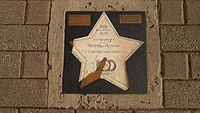
|
79/100 | Wittekindstrasse / corner of Lindemannstrasse | 1997 Matthias Sammer Champions League winner | Matthias Sammer was the captain of the BVB winning team in the 1996/97 UEFA Champions League ( note: the stone was initially incorrectly engraved or set and then corrected. ) |

|
80/100 | Lindemannstrasse 78 | 1997 Kalle Riedle Champions League winner | Two goals by Karl-Heinz Riedle laid the foundation for BVB's 3-1 victory in the 1997 Champions League final . |

|
81/100 | Lindemannstraße 78 (in front of the entrance of the Hotel Arcadia, formerly Pullman Hotel) | 1997 Paulo Sousa Champions League winner | The Portuguese Paulo Sousa was part of the BVB winning team in the 1996/97 UEFA Champions League , having won the title with Juventus Turin the year before . |

|
82/100 | at the BVB office, Rheinlanddamm 207–209 | Michael Zorc | Michael Zorc , who was born in Dortmund, has won a number of titles with BVB both as a player and as a sports director. |

|
83/100 | On the Max-Ophüls-Platz | 1997 Paul Lambert Champions League winner | Paul Lambert was part of the BVB winning team in the 1996/97 UEFA Champions League . |

|
84/100 | Max-Ophüls-Platz, in front of the pedestrian bridge over the B1 | 1997 Stefan Klos Champions League winner | Stefan Klos was the goalkeeper of the BVB winning team in the 1996/97 UEFA Champions League . |

|
85/100 | at the bridge over the B1, in front of the Westfalenhalle 3 | 1997 Stefan Reuter Champions League winner | Stefan Reuter was part of the BVB winning team in the 1996/97 UEFA Champions League . |
| 86/100 | At the Westfalenhallen | 1997 Stéphane Chapuisat Champions League winner | Stéphane Chapuisat was part of the BVB winning team in the 1996/97 UEFA Champions League . | |
| 87/100 | At the Westfalenhallen | 1997 Jürgen Kohler Champions League winner | Jürgen Kohler was part of the BVB winning team in the 1996/97 UEFA Champions League . | |
| 88/100 | At the Westfalenhallen | Trainer Ottmar Hitzfeld (most successful BVB trainer) | Ottmar Hitzfeld was BVB coach from 1991 to 1997 and won more titles than any other BVB coach. | |

|
89/100 | At the Westfalenhallen | 1997 world cup winner | In 1997, BVB won the World Cup in the final in Tokyo against Cruzeiro Belo Horizonte from Brazil 2-0. |
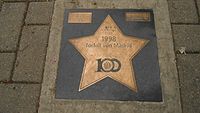
|
90/100 | On the way from Westfalenhalle 3 to Strobelallee | 1998 Madrid peat fall | When Madrid fell on April 1, 1998, a goal fell over at the Estadio Santiago Bernabéu in Madrid when Spanish fans closed the fence behind the goal before the kick-off of the 1997/98 UEFA Champions League semi-final match between BVB and hosts Real Madrid brought down the gate itself. A new goal had to be set and Real Madrid won the game, which kicked off 76 minutes late, 2-0. |

|
91/100 | On the way from Westfalenhalle 3 just before Strobelallee | 2000 IPO | In 1999, BVB spun off its taxable economic activities into the new Borussia Dortmund GmbH & Co. Kommanditgesellschaft auf Aktien . It went public on October 31, 2000 at an issue price of eleven euros per share, which fell to below two euros two years later. |

|
92/100 | In front of the Rote Erde stadium | 2002 BVB duo Metzelder & Kehl vice world champions | BVB players Christoph Metzelder and Sebastian Kehl were part of the DFB selection, which was runner-up at the 2002 World Cup . |

|
93/100 | Strobelallee, in front of the Strobels | 2002 6th German Championship | By winning the German championship in 2002 , BVB achieved its 6th championship title. |

|
94/100 | At Signal Iduna Park | Rescue from the financial crisis | In 2006, BVB only narrowly escaped insolvency that threatened its existence. |
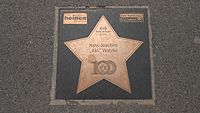
|
95/100 | At Signal Iduna Park | Hans-Joachim "Aki" Watzke | Hans-Joachim Watzke had been treasurer of BVB since 2001 when he became managing director of Borussia Dortmund GmbH & Co. KGaA in 2005. In this function he was jointly responsible for overcoming the financial crisis that threatened the existence of the association in 2006. |

|
96/100 | At Signal Iduna Park | 2006 Stadium upgrade for the World Cup | The stadium was a venue for the 2006 World Cup and was partially rebuilt for this purpose. |

|
97/100 | At Signal Iduna Park | For the best fans in the world | A stone to thank the club for the continued loyalty of the BVB supporters. |

|
98/100 | At Signal Iduna Park | South stand "The Yellow Wall" | The stone commemorates the support from the BVB supporters on the south stand, who ensure the internationally known atmosphere in the stadium. |

|
99/100 | At Signal Iduna Park | Kinderlachen eV | The stone is dedicated to the Dortmund non-profit association Kinderlachen , which has been supported by the BVB since it was founded in 2000. |
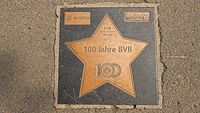
|
100/100 | At Signal Iduna Park | 100 years of BVB | This stone marks the end of the original Walk of Fame. The 100th birthday of BVB was the reason for the creation of the Walk of Fame. |
| 101 | ||||

|
102 | At Signal Iduna Park | 2012 8th German Championship | By winning the German championship in 2012 , BVB achieved its 8th championship title. |

|
103 | At Signal Iduna Park | 2012 DFB Cup winner 2012 | By winning the DFB Cup 2011/12 , BVB achieved the double in 2012 . |
| 104 | ||||

|
105 | 2004 Foundation of the BVB I Fan and Funding Department | In 2004, BVB founded its fan and funding department | |

|
106 | Silberstrasse / in front of the Lensing publishing house | 2014 Sebastian Kehl 6 years captain | Sebastian Kehl was BVB team captain for six years when he resigned from the post in 2014 and after 13 years at BVB announced the end of his professional career at the end of the 2014/15 season. |
literature
- BVB Walk of Fame route guide. Ruhr Nachrichten / Lensing Verlag, Dortmund 2010 (84 pages)
Web links
Individual evidence
- ↑ a b Article from September 10, 2010 on the laying of stone no. 8 by Dortmund's OB Sierau ( Memento of the original from July 2, 2016 in the Internet Archive ) Info: The archive link was automatically inserted and not yet checked. Please check the original and archive link according to the instructions and then remove this notice. on the BVB Walk of Fame website, accessed on June 26, 2016.
- ↑ Collection of press reports on stone laying ( Memento of the original from July 2, 2016 in the Internet Archive ) Info: The archive link was inserted automatically and has not yet been checked. Please check the original and archive link according to the instructions and then remove this notice. on the official website of the BVB Walk of Fame, accessed on June 26, 2016.
- ↑ “BRAINSTORM SPONSOR THE BVB WALK OF FAME AND BUY THE STAR OF THE BVB LEGEND ADI PREISSLER” , article dated June 25, 2010 on the sponsor's own website, Brainstorm, accessed on June 26, 2016.
- ↑ "BVB star stolen from the" Walk of Fame " , article from March 9, 2010 on Der Westen , the online portal of the Funke media group , accessed on June 26, 2016.
- ↑ "BVB Walk of Fame - Now" Stumpen-Rudi "also has his stone" , article by Hertener Allgemeine , accessed on June 26, 2016.
- ↑ "Kehl gets its own star" , article from June 30, 2015 in the online portal of the television channel Sport1 , accessed on June 26, 2016.
- ↑ Article on the BVB Walk of Fame from February 15, 2016 on the official Bundesliga website , accessed on June 26, 2016.
- ↑ D. Schulze-Marmeling, W. Steffen: Borussia Dortmund - The fame, the dream and the money. Verlag Die Werkstatt , Göttingen 1994, p. 40.
- ↑ The history of BVB - Part 6: The BVB history from 1949 to 1958 ( Memento of the original from July 2, 2016 in the Internet Archive ) Info: The archive link was inserted automatically and has not yet been checked. Please check the original and archive link according to the instructions and then remove this notice. , from Schwatzgelb.de , accessed on July 2, 2016.
- ^ "When a dog bit Friedel Rausch in the buttocks" , article from September 5, 2009 on the website of the daily newspaper Die Welt , accessed on June 26, 2016.